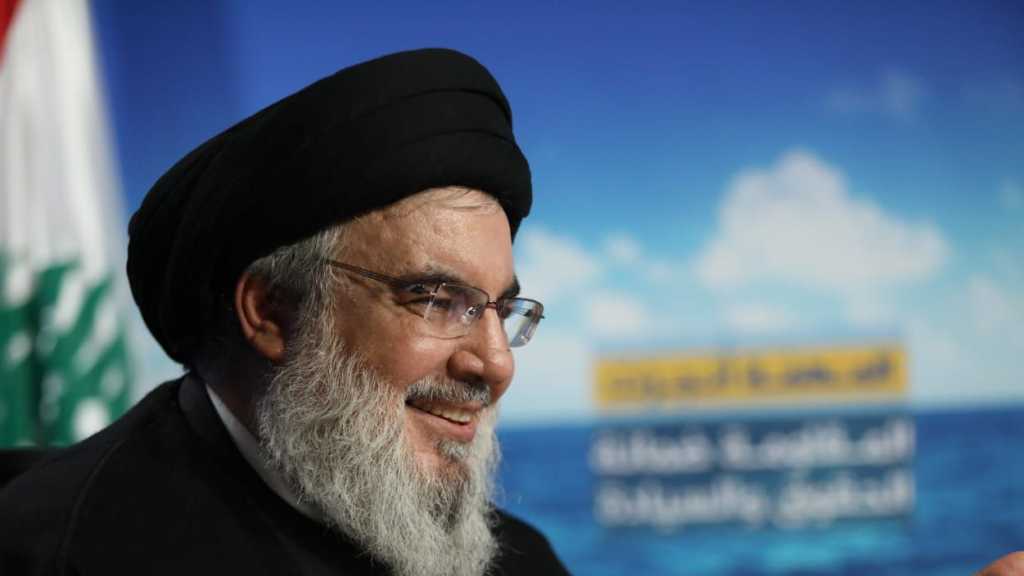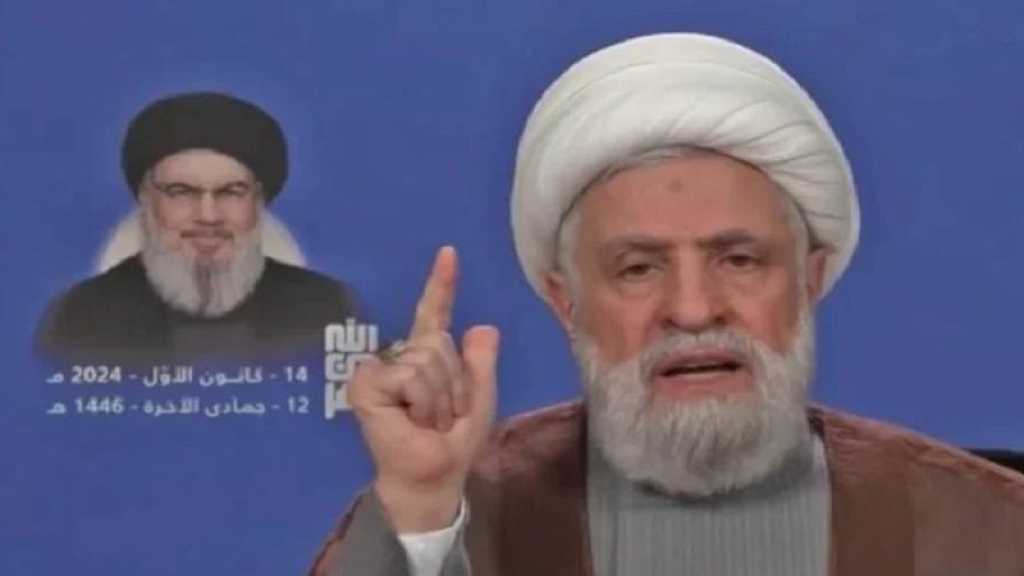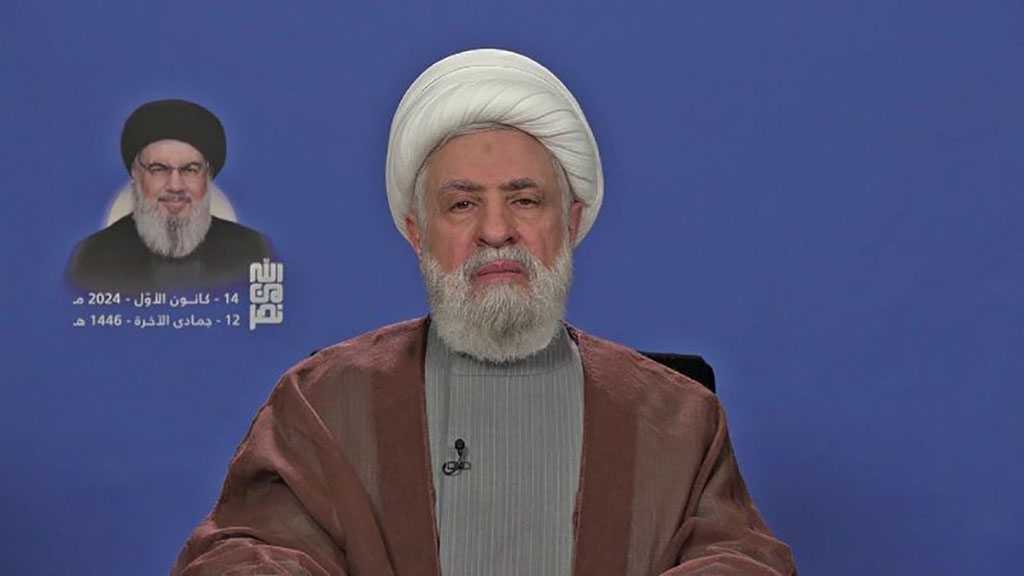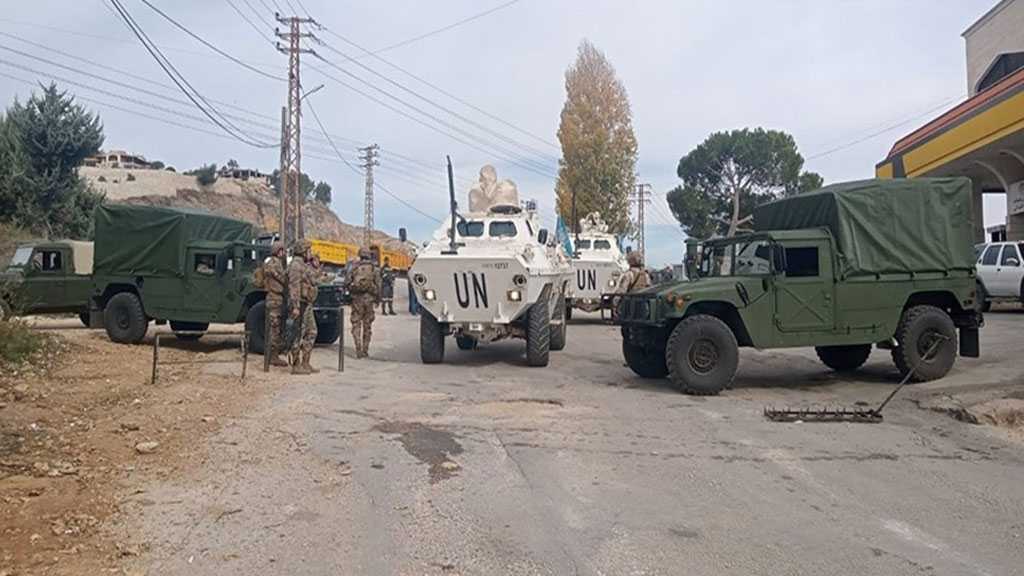
Sayyed Nasrallah: No One Will Be Able to Extract Gas from The Sea If Lebanon Doesn’t

By Al-Ahed news
Hezbollah Secretary General His Eminence Sayyed Hassan Nasrallah delivered on Saturday night a speech in which he tackled the issue of maritime boundary delimitation.
At the beginning of his speech, Sayyed Nasrallah recalled that “27 years on the martyrdom of Dr Fathi Shkaki, we remember him as an intellectual, revolutionist and leader.”
“The martyr leader Fathi Shikaki launched a new horizon for jihad and a new hope for Palestine and its people,” he said, noting that “Early did the martyr leader Fathi Shikaki discover the Islamic revolution in Iran.”
His Eminence further underlined that “The Islamic Jihad resistance movement continued its path and progress and became one of the leading factions that make the equations and achieve the major victories in Palestine.”
Moving to the Iranian scene, the Resistance Leader highlighted that “The large presence at the mass funeral of the oppressed martyrs in Iran resembles a strong message to all the conspirators that they are betting on a useless mirage.”
“The large participation in the mass funeral in Iran is a decisive response to the participants and planners in the strife,” he added.
In parallel, His Eminence move on to comment on the maritime boundaries delimitation document that was recently reached, viewing it as “a major and historic victory for Lebanon the state, the people, and the Resistance.”
According to Sayyed Nasrallah, “The ‘Israeli’ entity considers that its borders are from the Nile to the Euphrates, and it does not initially recognize borders, and considers that its borders are where its strength and might reach.”
Back to the beginning of the past century, he recalled that “The land border between the occupied Palestine and Lebanon was drawn by the French and British mandates, but no maritime boundaries have been demarcated.”
“After suggesting a few years ago that oil and gas exists, Lebanon was in need for demarcating its maritime boundaries,” His Eminence elaborated, pointing out that “There is something called the regional waters, whose area is calculated in a certain technique, and there is the adjacent waters, after which there is the exclusive economic zone; the regional waters are part of the Lebanese state which has full sovereignty over it and the right to use its resources.”
In parallel, Sayyed Nasrallah mentioned that “The Resistance since the 2000 liberation has emphasized that it doesn’t intervene in the demarcation of the southern border and that this is the state’s responsibility given beliefs and political reasons.”
“After identifying the maritime boundaries, Lebanon would identify its gas and oil blocks,” he said, noting that “Line 23 imposes on Lebanon to liberate this maritime zone under the title of regional waters and the exclusive economic zone, which is a national cause.”
Addressing those who criticize Line 29, he said: “Continue your struggle, away from the language of treachery,” clarifying that “The Lebanese state has considered Line 23 as its maritime boundary but has kept the door open to any adjustment.”
“Those demanding Line 29 should have started their political struggle since 1/10/2011 when the Lebanese state adopted Line 23; but in case the Lebanese state adopted Line 29, then the Resistance will have to fight until liberating all maritime areas northern this line,” The Resistance Leader confirmed.
As he elaborated that “The US administration has banned the companies that pledged to operate in the southern blocks over the past years,” Sayyed Nasrallah added that “The Zionist entity prevented the companies from carrying out a survey and the ‘Israeli’ enemy clearly declared that this area belongs after drawing line No 1.”
“The Resistance wasn’t asked to do anything before the end of the negotiations, but we were aware of what is going on,” Sayyed Nasrallah emphasized, noting that “Line 23 imposes on Lebanon to liberate this maritime zone under the title of regional waters and the exclusive economic zone, which is a national cause.”
Moreover, he clarified that “The reports mentioned that the area between Line 1 and Line 23 is around 879 square kilometers.”
Hailing the fact that “The Lebanese Parliament Speaker Nabih Berri all over the course of negotiations didn’t offer any concessions on Lebanon’s rights,” he recalled that “Official Lebanon, particularly Speaker Nabih Berri rejected the Hof line.”
“The “Israeli” enemy continued to adhere to line 1 and didn’t give any indication of accepting the Hof line,” he said, noting out that “After the extraction ship docked in Karish platform, the three presidents’ united stance was that starting extraction is an attack against Lebanon.”
“Based on the presidents’ statements, Hezbollah considered that the start of ‘Israeli’ extraction is an attack on Lebanon, and that this region is a disputed area,” His Eminence unveiled, pointing out that “The Resistance decided that it won’t allow the enemy to extract oil and gas from Karish before reaching a settlement that meets the official Lebanese demands.”
He further underscored that “US mediator Amos Hochstein was assigned and he presented a new proposal that was advanced from that of Hof, but it did not respond to the Lebanese demands. Here, transformations began in the region and the world.”
In addition, Hezbollah Secretary General viewed that “It was a decisive stance when the Resistance said it will prevent starting the extraction by force, even in case this would lead to a war.”
He also reminded that “All the fields and facilities in the occupied Palestinian waters are within reach of the missiles and drones of the Islamic Resistance in Lebanon,” stressing that “‘Israeli’ PM Yair Lapid’s government was neither able to go for a war nor to cancel extraction from the Karish Field, and this is why it was forced to go back for the negotiations.”
Explaining that “At some points, the negotiations reached a dead end, and we were in the aspect of heading to war,” Sayyed Nasrallah underlined that “The Americans also were under pressure since their priority meanwhile is the Russian-Ukrainian war, and Hochstein has said that the fear from war led to reaching a settlement.”
As he praised “The Lebanese negotiators who made a great effort and were subjected to a lot of pressure as the negotiations were not easy,” the Resistance Leader emphasized “Once we launched the drones, the ‘Israelis’’ field data confirmed that the resistance was preparing for an all-out war, and the they realized that.”
“Lebanon remained defiant in the face of the American pressures and the economic crisis, rejected the Hof Line, obtained Line 23 which it demanded, and insisted to obtain all maritime blocks in its exclusive zone, which it obtained indeed,” he went on to say.
Meanwhile, Sayyed Nasrallah stressed that “Lebanon has obtained all its demands from the negotiations except for one demand. Lebanon has attained the important achievement of lifting the US ban on the oil companies’ operation in the Lebanese waters. Lebanon has also obtained the Qana Field which stretches to reach south of the Line 23.”
“The ‘Israeli’ enemy didn’t obtain any security guarantees in the document, which is an achievement scored for Lebanon, he explained, noting that “Lebanon signed on a separate paper where the ‘Israeli’ signature was placed, and the Lebanese state was keen that no suspicion of normalization would take place.”
On the same front, His Eminence warned that “There is a 2.5 square kilometer area that hasn’t been settled yet, and we say it is an occupied regional water that Lebanon the state, the people, and the Resistance must work to restore and liberate.”
“We have practically obtained the liberation of this region and the freedom to work, and companies can go and work seriously,” he announced, pointing out that “The ‘Israeli’ enemy admitted to the balance of deterrence with the Resistance as a result of what happened in the maritime boundaries delimitation.”
According to him, “The real stance is that the official Lebanon, the Lebanese Resistance, and the people have considered this historic moment, behaved accordingly, and achieved this historic achievement.”
“The enemy’s unpreparedness to start a war was an important circumstance amid the all circumstances that pushed for finalizing the delimitation,” His Eminence underlined, noting that “The Palestinian resistance in the West Bank contributed to finalizing the maritime achievement as half of the ‘Israeli’ military was deployed in the West Bank and unable to fight on the Lebanese front.”
Moreover, he confirmed that “The ‘Israeli’ enemy’s unpreparedness to start a war was an important circumstance amid the all circumstances that pushed for finalizing the delimitation. The political situation within the enemy’s entity and the unpreparedness of the ‘Israeli’ military, added to the fears of economic losses were among the weaknesses that made the enemy refrain from confrontation.”
“The Lebanese people’s readiness to go with the state and the Resistance to the maximum choices represented an important factor in achieving the maritime issue,” Sayyed Nasrallah stated, noting that “The official defiance and the solidarity among the presidents, accuracy in not going towards normalization, the preparedness of the Resistance and sending drones to Karish, and the popular stance that supported the stance of the state and the Resistance all forms the strengths to achieve this.”
Furthermore, the Resistance leader stressed that “The threat with war was a decisive factor in reaching this historic moment. Today, we should celebrate this achievement, because Lebanon reached the edge of war, but did go into it.”
Once again, he reiterated that “The defiance of the people of Resistance, who were to be targeted by the enemy’s strikes in case of a war, was a strength to exert a pressure on the negotiations.”
“The enemy was aware that the Resistance’s threat to go for a war was serious, and let everybody learn that Lebanon was on the brink of a war but didn’t get involved in it,” Sayyed Nasrallah said, noting that “We were about to reach a war when the enemy announced its trial extraction, which it was forces to reverse from the shore to Karish.”
In this context, His Eminence viewed that “When the enemy witnessed the drones and field preparations of the Islamic Resistance it recognized that the Resistance in Lebanon is not deterred.”
He further revealed that “Had the war broken out, it was possible to turn into a regional war in which Palestine, Yemen, and all the other forces of the Axis of Resistance would have shared in, and this was an advantage for Lebanon.”
“The ‘Israeli’ enemy was surprised with the Islamic Resistance stance in Lebanon after thinking that the livelihood and the economic situation, and the political divisions would prevent the Resistance from going to the choice of power,” His Eminence stated, noting that “Lebanon was strong, brave and wise in the issue of negotiating the maritime boundary delimitation; it was strong in not submitting to the US-‘Israeli’ threats, brave in threatening with war, and wise in running the negotiations, and the media and political process.”
Warning that “No one will be able to extract or continue extracting gas from the sea if Lebanon does not extract its gas,” Sayyed Nasrallah underscored that “The Resistance in Lebanon wants security in the country, it is clear and decisive, but when the greater national interests require to surpass the rules of engagement it won’t hesitate even if the choice was the war.”
Comments



